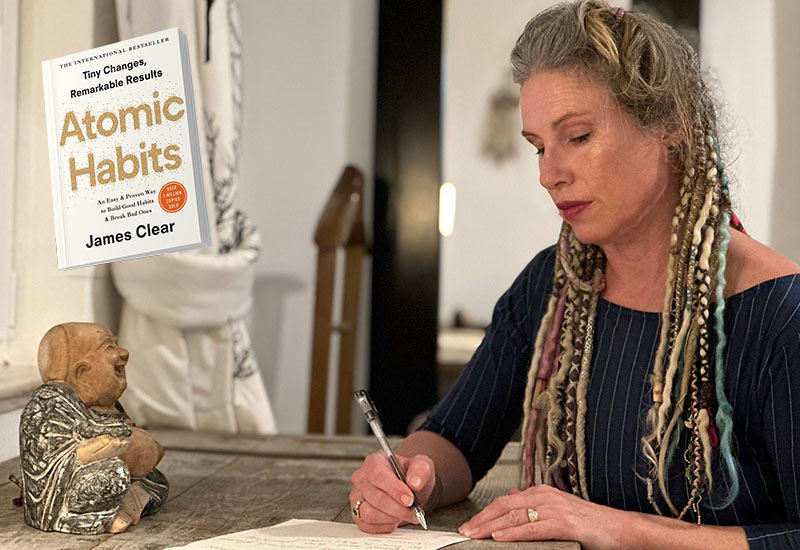Solutions for my Resolutions
It’s that time of year again. The Christmas lights still light up the streets and roundabouts. Tiny wooden trees and miniature Santas add cheer to store windows. Even Intermarchéh as strung colourful LED lights around the entire outside of the building in a nod to the annual festivity.
At our house, the Christmas tree goes up after Thanksgiving and usually stays until the end of January. This was our third Christmas in Portugal, and putting the synthetic tree back together hasn’t gotten any easier. The numbers on the stems and their corresponding holes are inevitably so askew that it takes construction geniuses like my eleven-year-old son to figure out which branches fit where.
Eventually, we managed. But I can’t say I love having a plastic tree. Some of my favourite Christmas memories are of going to the Christmas tree farm with my father to pick out the best tree. He would spend hours walking down the rows, examining branches and showing me how to tell a healthy, strong tree from one that would go dry and brittle quickly. The fresh scent of the tree, well over three metres tall and roasting beneath giant glass frames in our solarium, permeated our entire house. Every December, it was as if we had a small forest growing out of our stone floor. These days having a real tree feels on par with one of the seven deadly sins. If you can even find one. I’ve settled for essential oil. At least the house smells like Christmas. Sort of.
One thing that hasn’t changed about Christmas in Portugal is my commitment to making three New Year’s Resolutions. Just writing that down makes me sweat. I’m actually not a fan of change. I am a creature of habit. I like the comfort of familiar faces and predictable routines. Every Thursday, I go to yoga. I always fill my car at the same gas station. I shop at the same stores. I frequent the same cafes and order the same things off the menu.
I’m really good at habits. I’m an expert, in fact. I love habits. But not all of my habits are good ones. In fact, most of them probably slide somewhere between slightly bad to downright atrocious. So at the close of every year, I try to think of my worst offenders. I make a list. I put said list away for two weeks. I then shorten the list and narrow it down to three of my worst habits.
Then I spend the next few days racking my brain about ways to change those bad habits. Five cups of coffee a day. But how can I really only drink one? Chocolate as a bedtime snack. The idea of dreams without chocolate makes me nervous (I love my vivid dreams!). Procrastinating on deadlines? That one seems impossible.
In an effort to find outside help, I started researching how people shift habits successfully. Making a New Year’s Resolution is all about the determination to make change. Being ‘resolute.’ Right?
That’s what I was taught. Even the etymology of the word resolution implies a serious commitment. This word is no-nonsense. It’s no slouch. You do not mess with resolution. In the 1780s, when we first see the term used in relation to the new year, it was clearly defined as a determination to better oneself by making a pledge to do so. Like so many of our traditions, it was originally rooted in piety and religious promises. This adds to the idea of rigid willpower as an indicator of success. And an underlying sense of doom upon failure to maintain said willpower. That’s the part where I often trip. I start out really well in January, but by the middle of February, I’ve often slipped back into old patterns.
However, this year, I learned something new. Something that eases the burden of change. No matter what the resolution (lose the Covid kilos; eat less sugar; cut out gluten; add more cardio into my week; take a swimming class; finish my novel; learn to play guitar…), it’s not about the sheer force of our willpower. It turns out, it’s actually about routine.
That’s really great news because if you’re like me, you aren’t very good at maintaining willpower for long periods of time. According to James Clear, the author of Atomic Habits (a wildly successful book about how to effectively change your habits), shifting behaviour is not about setting goals but about focusing on the system.
“The most effective way to change your habits is to focus not on what you want to achieve, but on who you wish to become,” he writes.
That really throws my resolutions for a curveball. I have always focused on setting goals, not on how I would actually get there. I’ve been focusing on the problem instead of the solution.
So my list changed this year. Instead of goals, I wrote down who I want to be. I want to be a better mother. I want to be a kinder partner. I want to be a better acrobat. I want to be more sure of myself. I want to be stronger, mentally and physically. That feels much easier already.
According to Clear, the four laws of behaviour change are simple: (1) make it obvious, (2) make it attractive, (3) make it easy and (4) make it satisfying.
Well. Now I’ve got my work cut out for me. But it is far simpler to focus on who I want to be rather than what deprivations I can withstand for the longest. I still haven’t figured out exactly what habits I can change to be that person, but at least now I’m gonna keep it easy, fun and enjoyable. Once I’ve figured out my own system and the small changes I’ll make on a daily basis, over time, I’ll see big changes. Atomic changes, apparently. I’m starting with more routine. I’m hoping more structure will get me through the days when my intentions wane.
Hopefully, by the end of this year, I’ll be repeating habits that bring me closer to who I want to be. I’ll keep you posted. Happy 2023! Cheers to being your best you yet!
Meredith Price Levitt is a freelance writer, an American expat who identifies as a hybrid. After 20 years in Tel Aviv, she moved to the Algarve in December of 2019. Just in time for a global pandemic. You can contact her at meredithmprice@gmail.com













